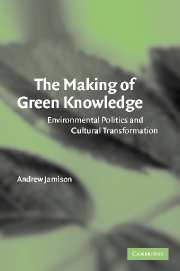Book contents
- Frontmatter
- Dedication
- Contents
- Tables
- Acknowledgments
- Introduction
- 1 On the ambiguities of greening
- 2 Social movements and knowledge-making
- 3 The dialectics of environmentalism
- 4 National shades of green
- 5 The challenge of green business
- 6 On the dilemmas of activism
- 7 Concluding reflections
- References
- Index of Names
Introduction
Published online by Cambridge University Press: 22 September 2009
- Frontmatter
- Dedication
- Contents
- Tables
- Acknowledgments
- Introduction
- 1 On the ambiguities of greening
- 2 Social movements and knowledge-making
- 3 The dialectics of environmentalism
- 4 National shades of green
- 5 The challenge of green business
- 6 On the dilemmas of activism
- 7 Concluding reflections
- References
- Index of Names
Summary
Using ideas as my maps …
Bob Dylan, “My Back Pages” (1964)Changes in culture and personality go hand in hand with our efforts to achieve a society that is ecological – a society based on usufruct, complementarity, and the irreducible minimum – but that also recognizes the existence of a universal humanity and the claims of individuality.
Murray Bookchin, The Ecology of Freedom (1982: 340)From recollections …
I left the United States for Sweden in August 1970 in search of an ecological society. I have not yet found it, but through the years I have caught glimpses, or premonitions, of what an ecological society might be like. This book is, among other things, an attempt to put those experiences into a broader historical and cultural perspective.
When I left for Sweden I had just graduated from a battle-scarred Harvard, having studied history of science and taken part in the antiwar movement and in the more all-encompassing “dialectics of liberation” that filled the air at the time (see Cooper 1968). I had stumbled into environmentalism a couple of years before, attracted by its combination of practicality and vision, its mixing of science and spirituality, and, perhaps especially, by its uncanny ability to make bedfellows of people with the most seemingly incompatible interests.
- Type
- Chapter
- Information
- The Making of Green KnowledgeEnvironmental Politics and Cultural Transformation, pp. 1 - 15Publisher: Cambridge University PressPrint publication year: 2001

